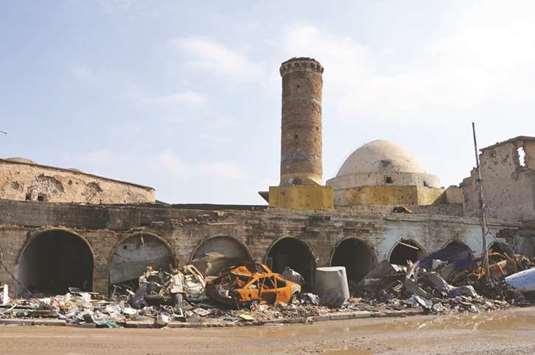Governments, global funds, organisations and investors yesterday pledged billions of dollars in loans and investment for the reconstruction of Iraq, a nation reeling from a three-year war against the Islamic State group.
Donors had pledged $30bn by the final day of the international conference, according to host nation Kuwait.
“The commitment of the international community at the conference was clear,” said Kuwaiti Foreign Minister Sheikh Sabah al-Khaled al-Sabah, adding that 76 countries, numerous international funds and global organisations and hundreds of investors had made pledges.
Baghdad says it needs nearly $90bn to rebuild after a grisly war with IS extremists which devastated homes, schools, hospitals and economic infrastructure, displacing millions of people.
Top contributors included Britain and Turkey, though each with its own stipulations.
Britain said it would grant Iraq export credit of up to $1bn per year for a decade.
Turkish Foreign Minister Mevlut Cavusoglu said his country would provide $5bn in loans and investment, without specifying the breakdown.
US Secretary of State Rex Tillerson on Tuesday said the Export-Import Bank of the US was set to ink a $3bn memorandum of understanding with Baghdad, which would “set a stage for future co-operation across key sectors of Iraq’s economy including oil and gas, transportation, and commodities”.
The Gulf states, led by host nation Kuwait, pledged $5bn in investment, loans and financing for exports.
Iran’s deputy foreign minister said Tehran would contribute to stabilisation efforts through the private sector, without announcing a financial pledge.
Iraq said its 10-year reconstruction plan would cost $88.2bn, of which $22bn was required immediately.
“We were hoping for more,” Iraqi Foreign Minister Ibrahim al-Jaafari told AFP at the close of the conference. “We are not disappointed, but the amount was less than expected,” he added.
The World Bank yesterday said the private sector should play a leading role for a “successful” reconstruction of Iraq.
“Many businesses from around the world have gathered here to discuss how they can invest in Iraq’s future and create the jobs that will help bring stability to the country.
Their presence in such numbers shows that Iraq is open for business,” World Bank president Jim Yong Kim said, echoing comments by the head of Iraq’s National Investment Commission.
Kim said the bank’s financial commitments to Iraq now top $4.7bn, up from $600mn in 2014 — though just two new projects worth $510mn were announced yesterday.
In Kuwait, the government of Iraqi Prime Minister Haider al-Abadi was working to attract foreign capital to fund a wide range of reconstruction projects.
But the call for investment came just days after an Iraqi court sentenced an Iraqi-American anti-corruption activist to six years in jail for defamation of state institutions.
Yesterday, al-Abadi sought to allay fears that funds would be lost to corruption, for which the country is notorious.
“We will not stop fighting corruption, which is not less than terrorism. In fact, it was one of the reasons for the rise of terrorism,” he told the potential donors. “Last week, we launched a string of measures to simplify procedures for investments,” al-Abadi said, adding his cabinet had ratified international covenants aimed at protecting investments.
Baghdad has put forward hundreds of projects, from oil refineries to massive housing and transport ventures, pointing to an investment law that offers ownership, unlimited cash transfers and tax breaks, among other benefits.
National Investment Commission chairman Sami al-Araji said investors in Iraq would find “high risks, but high returns”.

A general view of destroyed buildings in the northern Iraqi city of Mosul yesterday. Iraq received pledges totalling $30bn at an international conference for reconstruction of the war-torn country, the host Kuwait announced.
